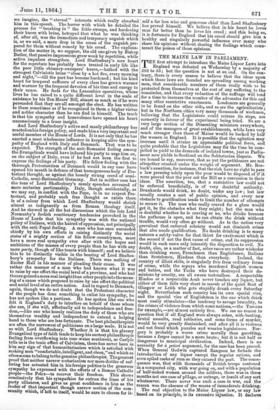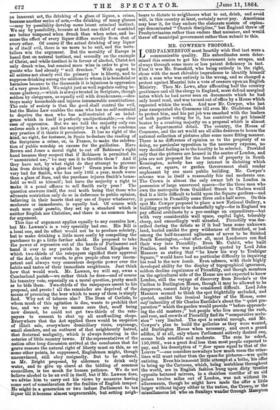THE MAINE LAW IN PARLIAMENT.
The real objection to the Maine Liquor law, or any law based on its principle, is its excessive injustice. It declares an innocent act, the drinking of a glass of liquor, a crime, beesusetnother series of acts,—the drinking of many glasses —may by possibility develop some latent criminal instinct. We say by possibility, because at least-one-third of mankind are better 'tempered when drunk than when sober, and be- cause the effect of every liquor differs morally from that of every other. Of course if the actual drinking of any liquor is of itself evil, there is -no more to be said, and the teeto- tallers win the argument. But the morality of Europe is based first on natural 'instinct, and secondly on the example of Christ, and while instinct is in favour of alcohol, Christ not only -drank -wine, but created more wine in order to give to guests who had already "well drunken." With regard to all actionstot clearly evil the primary law is liberty, and to suppress drinking among the millions to whom it is beneficial or harmless because to the thousands it is injurious is oppression of a very gross kind. We might just as well regulate eating be- cause gluttony,—which is always-treated in Scripture, though seldom by clergymen, as equally evil with drunkenness,—des- 'treys many households and injures innumerable constitutions. The rule of society is that the good shall control the evil, but the Maine Law enables the man who has no self-restraint to 'deprive the man who has self-restraint of an indul- gence which in itself is perfectly unobjectionable ;—a clear Case of oppression. But we are told the majority only can enforce such a law, -and the majority has a right to condemn any practice if it thinks it pernicious. It has no right of the kind, 'no right, for imitates, in Spain to declare the reading of the Scriptures a crime, or, in France, to make the celebra- tion of public worship an excuse for the guillotine. Have Brown and Jones a moral right to cut off Robinson's right hand because they suspect that if Robinson is permitted its "unrestricted use," he may use it to -throttle them ? And if they have not, by whatright do they attempt to prevent him from drinking a glass of beer ? Green peas in May are very bad for Smith, who has only 100/. a year, much worse than a glass of Bass, and the purchase injures Smith's house- hold as well as himself; but have the majority a right to make it a penal offence to sell Smith early peas ? The question answers itself, the real truth being that those who advocate restriction only do so in deference to public opinion, believing in their hearts that any use of liquor whatsoever, moderate or immoderate, is equally bad. Of course with such men cadit qucettio, they set up a 'standard which is neither English nor Christian, and 'there is no common basis for argument. This line of argument applies equally to any coercive law, but Mr. Lawson's is a very specially bad one. His Bill is a local one, and its effect would not be to produce sobriety, but to make drinking a little more costly by compelling the purchaser to go a little further afield. He proposed to take the power of repression out of the hands of Parliament and 'hand it over to any parish in the United Kingdom in which two-thirds of the ratepayers signified their approval of the Act, in other words, to give people often very incom- petent and always very censorious despotic power over the habits and tastes of their immediate neighbours. Just think how that would work. Mr. Lawson, we will say, owns a Cumberland parish—we rather think he does—and of course his tenantry vote, especially on a moral question, pretty much as he bids them. Two-thirds of the ratepayers assent to his proposal, and presto I all the remainder are deprived of the means of procuring the beer which to many of them is simply food. Why not of tobacco also? The Dean of Carlisle, to whom much of this agitation is due, wants to prohibit that too, and we are by no means sure that, snuff being now disused, he could not get two-thirds of the rate- payers to consent to shut up all snuff-selling shops. Beerywhere that the Act 'applied there would be suspicion of illicit sale, everywhere domiciliary visits, espionage, .small slanders, and an outburst of that neighbourly hatred, that fraternal malignity, which is always festering in the coteries of little country towns. If the representatives of the nation after long discussion arrived at the conclusion that for grave reasons the natural right of liberty must on this, as on some other points, be suppressed, Englishmen might, though unconvinced, still obey resignedly. But to be ordered, as Mr. Bright proposed, by aldermen to drink only' water, and to give up claret at the bidding of common councillors, is too much for human patience. We do not believe alcohol to be an evil in itself, but if Mr. Lawson does, we advise him to carry out his views by measures having some sort of consideration for the frailties of English temper. He might in a generation or two induce Parliament to tax liquor till it became almost unprocurable, but setting neigh- bours to dictate to neighbours what to eat, drink, and avoid will, in this country at least, certainly never pay. Americans may bear it, for they endure the elaborate system of espion- age denominated "Church discipline," but England threw off Presbyterianism rather than endure that nuisance, and would. throw off municipal government rather than submit to this.





























 Previous page
Previous page